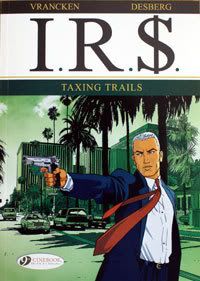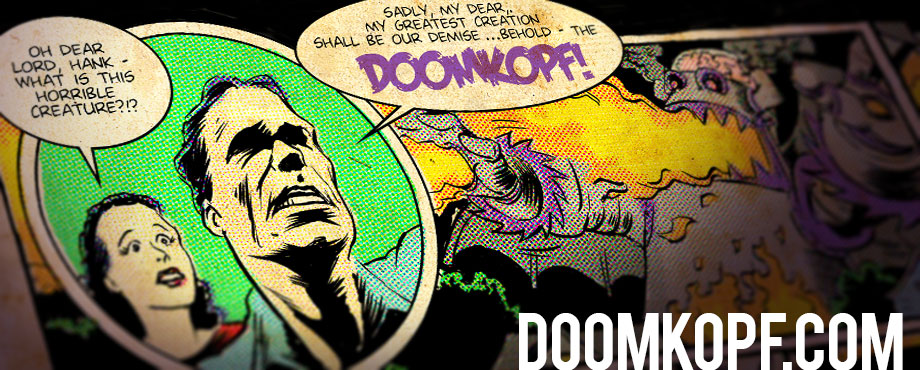IR$: Taxing Trails
By Stephen Desberg (W)
and Bernard Vrancken (A)
Published by Cinebook, 2008; 96 pages; $19.95
 When I saw a book called “IR$” about an IRS secret agent, I gave a mental groan. I actually put this book on the top of my review stack — I thought it would be super lame so I wanted to get it over with. The idea of reading some thriller via a tax man was just making me cringe with advance embarrassment.
When I saw a book called “IR$” about an IRS secret agent, I gave a mental groan. I actually put this book on the top of my review stack — I thought it would be super lame so I wanted to get it over with. The idea of reading some thriller via a tax man was just making me cringe with advance embarrassment.
Agent Larry B. Max gets called in to assist with cases that involve large sums of money. He reads “evasion and money-laundering rings like a pianist reads a Mozart piece,” says the Secretary of the Treasury during an expository golf outing. And he tells an FBI agent “I’ve got nothing against FBI files … but to get a real idea of someone’s life, believe me … there’s nothing better than to read his tax statements!”
This book has all the makings of an unintentional satire. A gunfight with a would-be assassin includes this exchange:
ASSASSIN shooting at Larry Max: “I’ve come to pay my taxes, sucker! With interest!” (BLAM BLAM)
LARRY MAX, IR$: “It’s time to liquidate this case.”
ASSASSIN: “I’ll give you as many bullets as it takes and I’ll put them all down as professional expenses!”
LARRY MAX: “Bloody Hell! That crazy woman’s going to turn this whole traffic line into a profit and loss statement just to take me out!”
So it was with much relief that I discovered IR$ actually has a great mystery driving it. The story is broken into two chapters — “Taxing Trails” and “The Hagen Strategy,” comprising the original two French volumes. Max follows the murder of a Swiss bank employee through several parties, all the way back to some historical drama coming out of Nazi concentration camps.
Max’s “IR$” intuition does drive the discoveries that advance the plot, but there are very human elements that make it far more enjoyable and engrossing than the stripped-down premise had me fearing. I was worried this “A ha, I have discovered the truth based on my keen mathematical sensibilities!” would be an agonizing gimmick, and it was far from it. At the end of the first volume, I was actually really disappointed because I thought they just caught the bad guy and left the ending unresolved; once I started the second volume, I realized they’d built another story around digging into the background.
The book is a quick and easy read, which is both good and bad. I found myself not wanting to put it down until I was finished, but at $19.95, that may be a high dollar-to-page ratio for some readers. Desberg’s use of history and the tragic backdrop gave the story some needed gravity. And for an adapted French comic, the translation is smooth and never gets in the way of the pacing.
Vrancken’s art is very realistic, with elaborate, highly detailed backgrounds. The bodies can be stiff at times, but his facial expressions are excellent.
The Grade: B
IR$: Taxing Trails is definitely a solid, above-average book, and it’s so much better than what I feared when I first saw it.

Keep up the well-written reviews, Jim Doom!